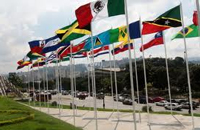Caribbean, Latin American nations forge alliance
By Saeed Shabazz -Staff Writer- | Last updated: Jan 23, 2012 - 12:38:33 PMWhat's your opinion on this article?

|
The Labour Party was saddled with an unemployment rate that stood at 12.9 percent, and a public debt totaling more than 120 percent of Jamaica’s Gross Domestic Product. Outgoing Prime Minister Andrew Holness reportedly attempted to spur the economy by attracting private investors to infrastructure projects, but the debt issue would not go away, leaving no wiggle room for his administration.
But his administration was not the only government that had economic problems and there is movement in the Caribbean to come together with Latin America to deal with some common issues and problems. The Caribbean Council warned back in February 2011, after conducting a survey amongst Caribbean nationals, that a major concern was the lack of a collective response to a regional economic crisis after the 2008 global financial meltdown. Another concern was a failure to deliver a regional policy on food security.
Caribbean unemployment in 2011 remained high—unemployment in the Bahamas was 14.2 percent and in Barbados the jobless rate was 12.1 percent due to sluggish economic growth, said the Caribbean Policy Research Institute.
According to the Alliance of Small Island States, Caribbean nations face an annual food-import bill of $3.5 billion. Meanwhile experts at the Inter-American Institute for Cooperation in Agriculture warn continued shifts in climate conditions could have hurt Caribbean food production. The obvious fear is climate change could increase the region’s dependence on external food production.
During an historic early January and late December tour of the Caribbean, the Honorable Minister Louis Farrakhan, of the Nation of Islam, delivered an electrifying address Dec. 10 to “a wide cross section” of Jamaicans, where he “encouraged Jamaicans to become self-reliant and to look to regional integration for collective survival.”
The Muslim leader, adeptly and with compassion, explained during a Dec. 14 address in Haiti how loans from the World Bank and the International Monetary Fund to Caribbean nations strangle their economies and help marginalize their existence. “So we have to break the chains that keep us from enjoying the good life,” Min. Farrakhan said.
Two weeks before Min. Farrakhan’s timely Jamaican address, leaders from Caribbean nations and their Latin American counterparts created an organization hoping to break some of those chains.
Leaders of 33 Caribbean and Latin American nations created the Community of Latin American and Caribbean States to deepen integration in the region and promote sustainable development.
The leaders stated during their inaugural summit, Dec. 2-3 in Caracas, Venezuela, that they came together to counter United States economic, political, military, and cultural domination in the region. Canada and the U.S. have not been invited to join the group.
This has been called the first integration movement that brings together all Latin American and Caribbean nations.
“CELAC is an important platform for the Caribbean region,” observed Suriname President Desire Delano Bouterse, according to the CARICOM-News Network. “We are here to advance political, economic, social integration and unity,” President Bouterse said.
In 1973, Caribbean leaders created CARICOM, a grouping of Caribbean states, to improve economic development through free trade and to develop cooperation in shipping, air transport, meteorology, health and educational training.
Later came the Organization of Eastern Caribbean States and the Caribbean Single Market and Economy, which has a base of 14 million people and aims to develop manufacturing and service industries, which play second fiddle to tourism, according to the Association of Caribbean States.
The problem small island states face in the Caribbean is large, emerging markets in the region, particularly in South America, compete for trade and investment. Leaders of the smaller nations say they must approach these issues collectively.
Dr. Denzil L. Douglas, prime minister of St. Kitts & Nevis, explained to CARICOM-Net News that in the past regional organizations were tempted to ignore small island nations, but he expressed confidence the new group would not follow that path.
According to Newsday, a paper published in Trinidad & Tobago, reduction of tariffs between members of the newest group will strengthen the varied economies and allow for a Latin American and Caribbean Free Trade Area.
The Community of Latin American and Caribbean States reflects the U.S.’s declining “hegemony” in the Western Hemisphere, according to Attorney Bruce Zagaris, a former lecturer in International Affairs at the University of the West Indies. Business between the Caribbean and Latin American nations and the U.S., U.K. and Canada is declining, he said.
For example, Trinidad & Tobago’s export of liquefied natural gas to the U.S. is down from 72 percent to 25 percent, according to InvestCaribbean.us.
“It is very difficult for the Caribbean to shape the larger discussion in the region concerning trade and investments; so there must be partnerships with nations such as Brazil, for example, who have the technology to produce tropical fruits for larger markets,” Mr. Zagaris told The Final Call from his law office in Washington, D.C.
There must be an integration of all services, including financial, tourism and cultural, to maximize the best use of Caribbean workers, he added. “There also must be input and a better discussion between Caribbean governments and civil society,” Mr. Zagaris stressed.
INSIDE STORIES AND REVIEWS
-
-
About Harriett ... and the Negro Hollywood Road Show
By Rabiah Muhammad, Guest Columnist » Full Story -
Skepticism greets Jay-Z, NFL talk of inspiring change
By Bryan 18X Crawford and Richard B. Muhammad The Final Call Newspaper @TheFinalCall » Full Story -
The painful problem of Black girls and suicide
By Charlene Muhammad -National Correspondent- » Full Story -
Exploitation of Innocence - Report: Perceptions, policies hurting Black girls
By Charlene Muhammad -National Correspondent- » Full Story -
Big Ballin: Big ideas fuel a father’s Big Baller Brand and brash business sense
By Bryan Crawford -Contributing Writer- » Full Story






 Click Here Stay Connected!
Click Here Stay Connected!








